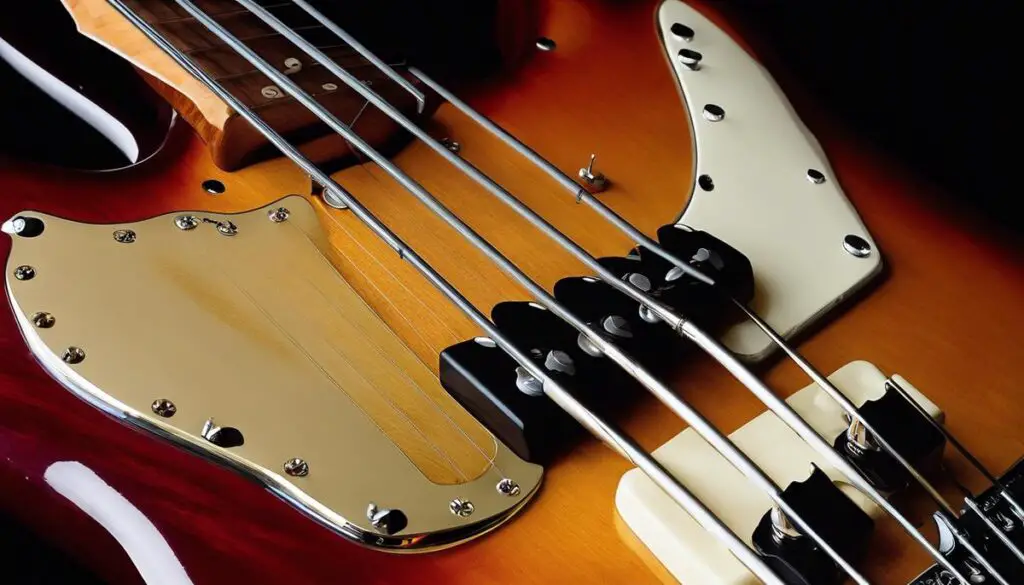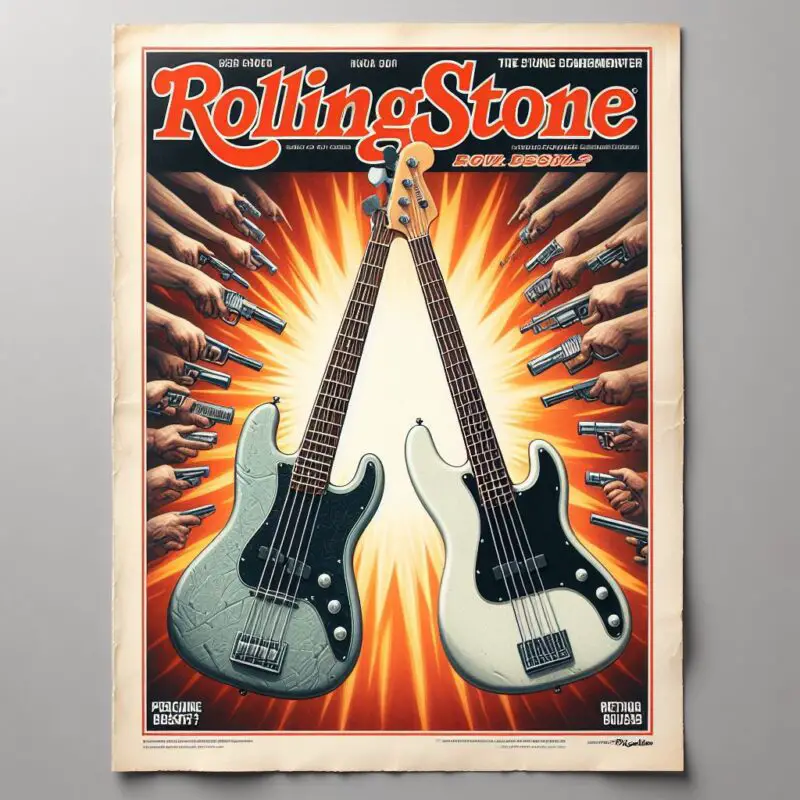Fender vs Squier P Bass. The bass guitar is a vital component of popular music, with Fender and Squier being two significant players in shaping its sound. In this comparison, we’ll explore the history, technical specs, pricing, and user experiences of their Precision Bass (P Bass) guitars.
Table of Contents
Historical Background and Legacy of Both Brands
Fender Squier P Bass
A few names stand out in the vibrant music world, encapsulating a brand and an entire lifestyle wrapped in waves of sound. Among them are Fender and Squier. These two names have been the beating heart of guitar music for decades, wheedling their way into concert halls, music festivals, and recording studios across the globe. Indeed, without them, the musical landscape as we know it would be an entirely different tune.
Let’s start with Fender, a name that shouts for itself in the annals of rock’ n roll history. Established in 1946, Fender has always been synonymous with innovation. Founder Leo Fender began an irreversible revolution by launching the Telecaster and Stratocaster designs. These solid-body electric guitars broke ground by offering artists a broader range of sound, freeing them to explore new musical horizons.
From the dexterity of Jimi Hendrix wailing out the Star-Spangled Banner on a Stratocaster at Woodstock in 1969 to the dulcet melancholy of Jeff Buckley strumming hallelujah on a Telecaster, Fender guitars have been dynamic tools in the hands of disruptors and torchbearers of musical generations.
I am not forgetting the Fender Precision Bass, which is loved by bassists worldwide for its remarkable tone.
With a defining low-end growl, it provided an undercurrent for the soundtracks of our lives with its trademark precision and power.
Meanwhile, Squier, a company initially established in the late 19th century for fine-stringed instruments, entered the picture differently. Reintroduced in 1982 as a subsidiary of Fender, Squier began churning out guitars that were essentially economical versions of Fender’s popular models.
Reliable and within reach, the Squier quickly became a staple for burgeoning musicians across the globe. It’s not merely an entry-level instrument; Squier has cultivated its roster of heavy-hitting artists, adding its unique hues to the musical canvas. Bands like Nirvana, Radiohead, and even the Rolling Stones have deployed Squier’s on their sonic expeditions, solidifying their mark in music history.
None of this is to mention the creation of the Jazz Bass by Fender in the early 60s, offering a warm, rich tone that permeated through jazz, blues, and eventually the robust world of funk. Or the Stratocaster’s coil pickups, an innovation that delivered a sharper, crisper tone that launched the guitar solos of the 70s and 80s into the stratosphere.
Fender and Squier guitars have become more than just instruments – they are revered as icons of our music culture. Strumming and resonating through arenas, garages, headphones, and hearts, they continue to create ripples in the endlessly thrilling ocean of music. These brands don’t just craft guitars; they sculpt the passion, innovation, and soul that shapes music as we know it.
Behind every frenetic riff, soulful serenade, electrifying solo, or pumping baseline, there’s a good chance a Fender or Squier is standing tall and resonating those emotions across the global soundscape. So, next time you catch a powerful gig or cozy up for a heartfelt i-Tunes session, listen closely – you might hear the timeless echo of these musical titans in the chorus.

The Technical Know-How: Features and Specifications
Wilting notes from a distant radio, a solitary bassline that has found its steady voice amongst the empowering hysteria of a live concert, or the plucky chords strummed in the bustling heart of a bustling city street – music is a universal language.
The rhythmic breath seeps through our global veins, surging life across nations, cultures, preferences, and talents. Each string vibration and drum beat echoes on the soul’s canvas, and each piece of musical machinery that brings forth these reverberations holds its tale ever so poignantly.
Allow us to delve into an exquisite narrative of two magicians of music – Fender Precision (P) Bass and its counterpart, the Squier P Bass.
The Fender P Bass, born out of the seasoned hands of Leo Fender in 1951, was an unblended sea-change that erupted in the realm of rhythm. Crafted meticulously with a slab body, a single coil pickup, and a one-piece maple neck, it brought forth the first-ever bass of the electric kind.
Known intimately among musicians as the “P-Bass,” its manifestation paved the way for better volume and sustain than its upright counterparts. A solidbody that shielded its integrity against the weather and a fretted fingerboard for precision redefined the rising tides of rock n roll.
Marked with an iconic split-coil pickup added in 1957 and an option for a rosewood fingerboard introduced in 1959, it was the undoubted monarch of electric basses. Its heavyweight build, profoundly full-rounded tone, and massive sustain continue to donna a regal attire in the musical world. With significant artists like ‘The Police’s’ Sting and ‘Black Sabbath’s’ Geezer Butler, this bass beast became a staple of rock, pop, and everything in between.
Conversely, the Squier P Bass presents its bouquet of musical dimensions. Emerging as a subsidiary of Fender in the 1980s, Squier offered quality instruments for those under a budget who aspired to hit their strings into the vast universe of tunes. The Squier P Bass emerged as one of their remarkable variants, offering numerous models from the Squier Affinity to Vintage Modified Precision Basses.
Technically, the Squier P Bass mirrors the Fender P Bass in design and basic architecture yet carries a lighter burden on the shoulders, both in weight and price. Made from a lightweight agathis body wood, it dawns a softer tone in contrast to the full-fat bass voice of Fender. Yet the Squier variant wouldn’t hold back in throwing a courageous punch capable of cutting through the mix.
At its heart, the difference lies in subtleties—the choice of material, precision in craftsmanship, finesse in design, and affordability, all culminating in a unique tone that separates the Fender P Bass from Squier’s P Bass. While the Fender immerses itself in rich tonal depth and sumptuous detailing, the Squier spins a tale with affordable accessibility and tonal competence.
Both stand tall, resonating with the stories they wish to tell through their sound, beckoning those ready to listen with open hearts and resonating souls. These remarkable instruments are not rivals competing but siblings, each with distinct personalities, compounding the reverberating spectrum of music.

Pricing and Value for Money
fender vs squire
Sailing into the realm of music where tone, resonance, and rhythm hold sway rests the timeless debate: Fender P Bass or Squier P Bass – which one offers more bang for your buck? Let’s delve into the vibrant world of bass guitars and explore each instrument’s unique attributes, pricing, and overall value for money.
Novices and professional musicians alike have long celebrated the intoxicating blend of dynamics and simplicity in the Fender P Bass. This trailblazing bass titan resonates with the rich legacy of Fender, a leviathan in musical instrument manufacturing known for its impeccable marriage of artistry and craftsmanship.
Boasting a hefty, full-bodied tone that has echoed through countless music halls and recording studios, the Fender P Bass has an enticing color palette of sounds, a characteristic highly coveted by bass enthusiasts. However, these features come with a shepherd’s price, typically retailing between $1,500 and $2,000, positioning it firmly in the domain of professional musicians and dedicated enthusiasts with discerning ears and a propensity for premium products.
But the Squier P Bass, a spirited offspring of the Fender family tree, doesn’t trail too far behind. Squier carries the torch for Fender, bestowing the budget-conscious the enchanting Fender experience without cracking their wallets.
Despite being the more cost-effective counterpart, retailing between $200 and $500, Squier isn’t shy about bearing its teeth. Squier P. Basses brandishes a respectable tone that can quickly bounce around various musical genres. These instruments are finely crafted and reliable, offering an attractive entry point for aspiring or intermediate music maestro.
However, it’s essential to remember that value isn’t a universal measure but a personalized treasury held in the heart of every musician. A professional gigging musician or recording artist may find the rich tonal attributes, versatility, and high build quality of the Fender P Bass justify its higher price tag, becoming their vehicle to musical nirvana. On the other hand, an aspiring artist or hobbyist might find the Squier P Bass embodies elements of the Fender essence at a price point that keeps the music dream alive.
At the heart of it all, both Fender P Bass and Squier P Bass play a critical symphony in music-making, each with a distinct part. The Fender P Bass sits majestically at the top of the spectrum, pampering professional musicians with its nuanced sounds and grandeur. Simultaneously, the Squier P Bass becomes the real-world hero, making quality music accessible, one bass line at a time.
In this symphony, no component strives for solitary victory; instead, they meld into a harmonic ensemble, inviting all to partake in the enchanting world of music. A more profound understanding of this dynamic bolsters the assertion that value for money doesn’t solely lie in the price tag but in the individual’s musical journey, genre, capability, and sonic preference. In the end, the music is what truly matters.

User Experience: Reviews and Pragmatic Pros and Cons
Diving into the deep end of the conversation, both Fender P Bass and Squier P Bass arm musicians with an incredible arsenal of tones at their fingertips. The sultry vibrations resonating from a Fender P Bass foster an unparalleled authentic vintage charm, creating the crème de la crème of a bass symphony.
A mid-century classic, the Fender P Bass wielded by legends such as James Jamerson and Carol Kaye, has remained consistently reliable and adored amongst musicians. Thus, its slightly more elevated price reflects its long-standing adoration.
On the other hand, the dexterity embedded within every Squier P Bass is a force to be reckoned with. Versatility permeates every note thrown from a Squier P Bass, making it popular among budding artists and the underground music scene. Sonic trips, punk jumps, or jazz spins – Squier covers it all. Priced more affordably than its Fender equivalent, it’s a budget-friendly choice while still delivering exhilarating audio experiences.
However, the devil is in the details when comparing the playability of these bass juggernauts. The Fender P Bass has a chunkier neck, giving the user a firm gr. The tone becomes bolder and deeper as pressure is applied to the string. This tonal bravado in sound is perfect for those with a penchant for bluesy licks or rock anthems.
In contrast, the Squier P Bass has a slimmer neck profile, allowing for faster, defter movement along the fretboard. Its comfort makes it ideal for quick-walking bass lines, characteristic of genres such as jazz and funk, or for an enthusiastic entry-level bass player.

Navigating through the labyrinth of opinions on these bass masterpieces, user reviews sing harmonious approval for Fender’s sublime craftsmanship, the profound bass depths reached, and the enduring legacy held by the P Bass. Equally, Squier fans commend the sleek agility of the Squier P Bass and its capability to produce an array of tones from visceral punk riffs to delicate indie melodies.
However, it’s important to note that this discussion isn’t about crowning a ‘king.’ High notes might be hit on a costly instrument, or a loud symphony might erupt from an affordable, albeit quality option. Ultimately, the magic lies not within the instrument but the one holding it. As the heart echoes through the strings, barriers crumble, uniting listeners and creators in a shared story of sound.
In the debate of Fender versus Squier, practicality and personal needs intertwine. Both platforms stand as steeds in the expedition of musical discovery from the seasoned bassist to an emerging musician. A crucial component of the Fender P Bass and Squier P Bass exhibit is that price doesn’t shackle quality and satisfaction. Remember, the music is in your hands, not your wallet. This pair of heroes in bass craftsmanship ensures the fire of creativity is kept ablaze – regardless of the choice made!

The intriguing comparison of Fender and Squier P Bass has presented impressive evidence, cementing their roles as linchpins in the world of bass guitar performances. Both brands carry significant weight, shaping popular music’s tonal landscape and fueling the passions of bassists globally.
Their differences seem to lie in the nuances – the feel, the sound, the quality, the price – factors that ring different chords with different musicians. As the melody fades out, remember this – every choice is ultimately an extension of your artistic expression, a supplement to your musical aspiration, and both Fender and Squier stand committed to amplifying your authentic voice.
Fender vs Squier P Bass Table
Here is a basic table of differences between a Fender and a Squier Precision Bass:
| Feature | Fender Precision Bass | Squier Precision Bass |
|---|---|---|
| Price | Expensive | Affordable |
| Country of origin | USA | Indonesia, China |
| Body wood | Alder or Ash | Basswood |
| Neck wood | Maple or Rosewood | Maple |
| Fretboard radius | 9.5″ | 9.5″ |
| Fretboard material | Maple or Rosewood | Maple |
| Number of frets | 20 | 20 |
| Pickups | Single-coil | Single-coil |
| Bridge | Standard | Standard |
| Tuners | Standard | Standard |
| Nut | Synthetic bone | Synthetic bone |
| Finish | Glossy | Glossy |
Please note that this table is not exhaustive, and there may be other differences between the two basses. Also, the differences may vary depending on the specific models of the Fender and Squier Precision Bass.
Here is a table of differences in prices of similar models between a Fender and Squier Precision Bass:
| Model | Fender Precision Bass | Squier Precision Bass |
|---|---|---|
| Classic Vibe ’60s | $449.991 | $429.991 |
| Player | $699.991 | $449.991 |
| American Ultra | $2,099.991 | N/A |
Please note that the prices mentioned above are subject to change and may vary depending on the specific model and location. Also, the prices may vary depending on the time of purchase and the store you buy from.
Source: talkbass.com, prosoundhq.com, prosoundhq.com, guitarworld.com, reverb.com


